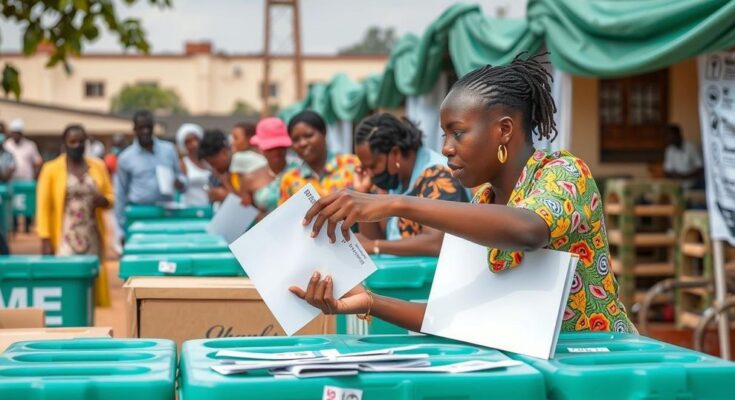Elections in Ghana have opened amidst an economic crisis, highlighting a critical test for democracy in West Africa. Approximately 18.7 million voters will decide between two main candidates, Mahamudu Bawumia and John Dramani Mahama, amid widespread dissatisfaction with the country’s economic direction. The electoral outcome will reflect the future of Ghana’s governance amidst significant challenges including inflation and job shortages.
Polls opened in Ghana on Saturday for presidential and parliamentary elections, marking a significant moment for the nation amidst a severe economic crisis. Approximately 18.7 million registered voters will participate in elections seen as a vital gauge of the country’s democratic resilience, particularly at a time when West Africa is experiencing turmoil due to coups and extremist violence.
Historically, Ghana has been recognized as a model of democracy, having maintained peaceful elections since the introduction of multiparty politics in 1992. However, current challenges have overshadowed this legacy, with the nation grappling with soaring inflation and persistent unemployment, causing widespread dissatisfaction among the populace. An opinion poll from Afrobarometer revealed that a staggering 82% of Ghanaians believe the nation is on the wrong path.
In this election, twelve candidates are vying for the presidency, yet the contest centers primarily on two prominent figures. Mahamudu Bawumia, the candidate of the ruling New Patriotic Party (NPP), faces off against John Dramani Mahama, the former president representing the National Democratic Congress (NDC). The NPP has struggled to address the economic downturn, while Mahama aims to regain office after his electoral defeat in 2016, which followed unmet economic promises.
Both candidates present similar proposals, lacking significant divergence in their platforms. Concurrently, Ghana will elect 276 parliamentary candidates, with previous parity in the legislature between the two major parties; the NPP and NDC currently hold 137 seats each in a 275-member body.
As the candidates held their final campaign rallies, Bawumia pledged to continue the previous administration’s attempts to stabilize the economy, while Mahama vowed to “reset” the country in various aspects, including governance and economic health. Despite the upbeat atmosphere in the capital with rallies and public events, many citizens remain concerned about the country’s economic state.
Ghana’s economy has recently suffered a default on foreign debt and escalated inflation rates, which reached 54% by the end of last year. Though inflation has since diminished, many citizens have not experienced noticeable changes in daily living costs. Further exacerbating economic challenges is the rampant illegal gold mining practice, referred to as “galamsey.” This illicit activity has grown as individuals seek employment amid a deteriorating labor market, resulting in environmental degradation despite government crackdowns.
Ghana has long been considered a democratic stronghold in West Africa, especially notable for its history of peaceful transitions of power and robust electoral processes. Nonetheless, the country is currently enmeshed in a severe economic crisis characterized by high inflation, job scarcity, and substantial public discontent. This context presents a critical backdrop for the upcoming elections, as Ghanaians grapple with the failures of both major political parties to improve their economic conditions, resulting in heightened scrutiny of the political candidates and their platforms. With an electorate of over 18 million facing economic hardships, the elections not only impact domestic governance but also reflect broader regional trends where democratic institutions are under threat. The upcoming results will serve as a litmus test for democracy and economic viability in a region witnessing increasing violence and political instability.
The presidential and parliamentary elections underway in Ghana underscore a critical juncture for the nation’s democracy, particularly in the face of economic hardship. With a mere two candidates dominating the electoral landscape and lacking significant differentiation in their agendas, the outcome is pivotal for the future direction of Ghana’s governance and economic stability. Voter sentiment exposes a profound discontent, emphasizing the pressing need for effective solutions to the economic crisis that afflicts the majority of the population.
Original Source: www.voanews.com




